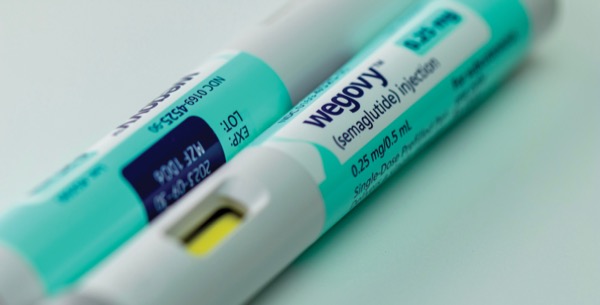Glucagon-like peptide-1 receptor agonists are well tolerated and effective for weight loss in patients with inflammatory bowel disease, with a safety profile similar to that observed in the general population prescribed these medications, according to data presented at DDW 2024 by a team of researchers from the University of Pennsylvania.
{RELATED-VERTICAL}Researchers also saw a reduction in C-reactive protein (CRP) levels, although they said more data are needed to fully explain this change.
Experts said this study is particularly relevant given that obesity now affects 15% to 40% of people with IBD (Nat Rev Gastroenterol Hepatol 2017;14[2]:110-121).
The intersection of obesity and IBD presents unique therapeutic challenges, including an association with increased disease severity, decreased rates of steroid-free remission, and higher risks for surgery and treatment failures with biologics (World J Gastroenterol 2023;29[12]:1779-1794). Traditional treatments for IBD, such as tumor necrosis factor inhibitors, often have diminished efficacy in obese patients (Eur J Gastroenterol Hepatol 2022;34[6]:622-629; BioDrugs 2022;36[2]:197-203). GLP-1s, known for their effectiveness in managing type 2 diabetes and promoting weight loss, are emerging as a potential therapeutic option to optimize outcomes in IBD.
“When we noticed that obesity and, specifically, visceral adiposity is associated with increased frequency of IBD flares, we wanted to know if medicines that reduce obesity could also improve outcomes in IBD,” lead researcher Priya Sehgal, MD, MS, MPH, a former IBD fellow at the University of Pennsylvania and current assistant professor of medicine at Thomas Jefferson University Hospital, in Philadelphia, told Gastroenterology & Endoscopy News.
To evaluate the safety and efficacy of GLP-1s as an adjuvant treatment for IBD, Dr. Sehgal and her co-investigators performed a retrospective analysis involving 244 IBD patients (142 with Crohn’s disease and 102 with ulcerative colitis) who were treated with GLP-1s for at least three months from 2017 to 2023. The treatments included pure GLP-1s dulaglutide (Trulicity, Lilly), exenatide (Byetta, AstraZeneca), liraglutide (Saxenda/Victoza, Novo Nordisk) and semaglutide (Ozempic/Wegovy, Novo Nordisk), and the dual GLP-1 and glucose-dependent insulinotropic polypeptide receptor agonist tirzepatide (Mounjaro/Zepbound, Lilly).
The researchers looked at how much weight IBD patients lost after three to six months of GLP-1 therapy. The analysis showed that patients experienced a significant reduction in body weight, with a mean percentage change of just over 5% from baseline to week 12. Semaglutide was particularly effective, with patients on this medication showing a weight reduction of more than 6% on average.
In addition, there was a statistically significant decrease in CRP levels at the three-month follow-up. In the 71 patients with available CRP levels, the researchers saw an average decrease from 10.1 to 3.0 mg/dL (P<0.01). They also observed a numerical decrease in fecal calprotectin in the 32 patients with data available, but it was not statistically significant (824.9-234.7 mcg/g; P=0.13).
“The significant decrease in CRP is not specific to gut inflammation,” Dr. Sehgal said. “It may reflect an association between GLP-1 receptor agonist use and a reduction in systemic inflammation. It would be interesting to see further research devoted to understanding the effect of GLP-1 receptor agonists on levels of systemic inflammation. A reduction in CRP levels hints at a potential anti-inflammatory effect in reducing obesity, which could be beneficial in managing IBD.”
The researchers also analyzed safety and adherence data, finding that 83% continued GLP-1s after three months. Adverse events were reported in 13% of patients, with nausea and vomiting being the most common. One patient (0.2%) reported a serious adverse event (pancreatitis). “The adverse events and discontinuation rates were similar to [those seen in] the general population with obesity and type 2 diabetes,” Dr. Sehgal said.
An Important Start, but More Research Is Needed
The results provide a new avenue for managing obesity in IBD patients. Given the association between obesity and more severe IBD phenotypes, incorporating GLP-1s into treatment regimens may enhance overall patient outcomes. “This may be a course of therapy for doctors to discuss with IBD patients in remission,” Dr. Sehgal said, “but more longitudinal research is needed to see if the use of anti-obesity medications in an IBD population correlates to endoscopic healing and long-term remission.”
However, Dr. Sehgal and her co-investigators warn that caution is advised for patients with a history of pancreatitis or those experiencing upper GI symptoms.
Commenting on the findings, Patricia Kaazan, MD, a gastroenterologist at the University of Adelaide and South Australia Gastrointestinal Services, who studies obesity in patients with IBD, said the study lays the groundwork for GLP-1s to play a part in combating obesity and type 2 diabetes in IBD patients. “I think this is an important and much needed study. In view of [GLP-1s’] gastrointestinal side effects, establishing their safety and tolerability in patients with IBD is a good starting point. As more research develops on the safety and impact of weight-reduction strategies on disease activity and inflammation—as well as the efficacy of biological therapies and novel agents in obese patients—I think that we should [start to] feel comfortable prescribing these medications for our IBD patients, as they appear to be safe and might have a role in modulating or controlling the gut inflammation.”
—Jordan Davidson
Drs. Kaazan and Sehgal reported no relevant financial disclosures.

